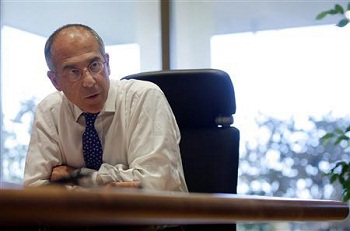Since its inception in 2008, Francesco Starace is Enel Green Power or EGP's CEO. On Thursday, the holding company, which has a Spanish branch with Endesa's renewable assets integrated, celebrated its first anniversary on the stock market. Francesco Starace's comments about the sector in Spain are, to say the least, jarring, so we have selected (and highlighted) a few of his answers to an interview published in the financial newspaper Cinco Días for the readers of The Corner.
 Is it possible in Enel's case that there be a turning back operation as the Iberdrola Renewables one? That was a difficult operation to understand, without economic logic and bad for the minority. Unlike Iberdrola, EGP's price is higher now than when it began trading. The parent company of the renewable placed it a bargain price. Enel would have to pay a lot to re-buy its subsidiary and, although it would be a good deal for the shareholders, this is not our intention.
Is it possible in Enel's case that there be a turning back operation as the Iberdrola Renewables one? That was a difficult operation to understand, without economic logic and bad for the minority. Unlike Iberdrola, EGP's price is higher now than when it began trading. The parent company of the renewable placed it a bargain price. Enel would have to pay a lot to re-buy its subsidiary and, although it would be a good deal for the shareholders, this is not our intention.
Some believe that in Spain there is regulatory uncertainty. Do you agree? Spain is five years ahead in the development of renewables, because it started earlier and it can not be criticized without taking into account that there has been a more rapid and profound development. I often say that, if Italy, France, Greece and Romania want to know what will happen, they have to catch a plane and come to Madrid. There are problems that Spain has already resolved and that other countries are trying to solve now. The transformation is very interesting because it will set the tone for the rest of the other countries. In my opinion, the change of the regulatory framework that will occur will be much broader, going beyond renewables.
Another belief is that the renewables premiums in Spain are the highest in Europe. No. The record is in Italy; and, in France and Spain, they are similar.
The problem then is that in Spain there are many megawatts? Yes. Renewables are not child's play where you have to keep the children happy so they won't bother you. It is a very important part of the energy mix and it will not disappear. There are many non-industrial investors and knowing how to treat them is a very interesting matter.
* The original interview, here.




